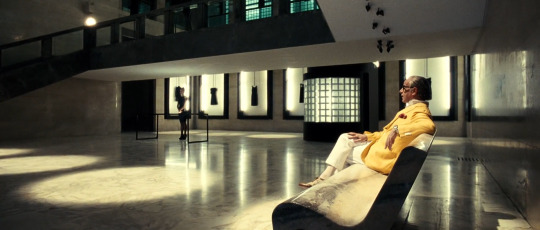#the silvio discourse with him)
Explore tagged Tumblr posts
Text
SO close to strangling my dad for what he's saying about berluconi... what a deeply ignorant little man he is at heart
#also he's sprouting a lot of catholic perbenismo that's making me nauseous#and my mom parroting him because she's got no actual opinions of her own...... (i'm sure she'd be parroring ME if i ever breached#the silvio discourse with him)#the thing about my dad is that i don't like him. i love him to death and he and my mom and siblings are the most important people in my life#and idk how i'd live without him#but i don't like him as a person. i don't like his opinions or temperament. i hate how he practically forced my brother in the closet#~to not hurt his DeLiCaTe sensibilities (aka homophobia) while my brother has to swallow his fascist nostalgia/apologia#and all the bs he says. i hate how he NEVER takes me seriously and laughs at me whenever i get angry with him#and treats me like a china doll/a misguided 15-year-old just because of my mental condition even when he claims i'm an intelligent person#i hate how he finds an opportunity to belittle my mom and mock her and never treat her as an equal at every turn#and she has to bear with all of this + his untreated anger issues (ever since i was a little girl i remember i promised myself i would NEVER#end up in a marriage like theirs and since then i've always been highly sceptical of marriage as an institution)#i hate that he always thinks he's right even when he makes 0 efforts to research a subject my brother is infinitely more knowledgeable about#because apparently he's ~suspicious of even basic stuff like reading the wiki or a fucking book and gets his Superior Knowledge#from the Heavens/God Almighty/his famously Big Brain etc.#i hate how he thinks he's the pinnacle of morality even if he's just a mean-spirited 'mussolini ha fatto anche cose buone'#kind of ~uomo perbene. he's just an unpleasant person i'd normally never associate with (no wonder he has no friends) except he's my dad.#val speaks#txt
4 notes
·
View notes
Text
I don't think I can properly convey how long I've wanted for Berlusconi to die (I knew he would never simply retire, and in fact he didn't even if he was ill). I grew up and came of age in the 90s/early 00s and he and his absurd stunts were inescapable, everything was about him, what he wanted, what he'd said five minutes earlier. It was literally everything that was talked about on newspapers and tv, and it revealed the actual emptiness of the political discourse on every side. Italian democracy has always been a very fragile project and Silvio Berlusconi never hesitated to grab a chance to bludgeon it to pieces, while too many people stood there and watched helplessly as it happened
9 notes
·
View notes
Text









The Great Beauty, focused on the sixty-fifth birthday of a successful journalist and social animal in Rome, is a wonderful film: it presents a cosmopolitan portrait of life, and each image in the film seems well-chosen, for its architecture and interior design, for the presentation of nature and scene and visual art, for the location and placement of persons and movement. The central character among many eccentric characters, the journalist Jep Gambardella is smart and suave, a libertine who is too self-aware and honest to be self-infatuated or proud, and too generous to be cynical. Jep Gambardella (actor Toni Servillo) is a wonderfully believable and likable character. His life has been easy (his friends are rich, and he has a grand apartment, and the women are still attracted to him), but that has been part of his problem: Jep has not had to demand much of himself. The motion picture is full of personalities and their smart talk, and it presents diverse stories, different lives, with their comedy and drama. The Great Beauty could be a continuation of the work of great film directors such as Visconti, Fellini, and Bertolucci, men who created photoplays of grandeur and history, strangeness and truth. The importance of consciousness, personal choice, public discourse, art, money, and politics are the content of the conversations, conversations that are serious and also distractions from private dilemmas—a second book that was never written; a husband in love with someone else; a disturbed, suicidal son. The film allows meditation on modern existence, on the complexities and idiosyncrasies of modern contemporary life in great cities: the personal liberties and odd loneliness, and collisions of past and present, prominent industries, celebrity culture, jazz, cocaine, botox parties, and indulgent sexuality. by Daniel Garrett Volume 21, Issue 8 / August 2017
The film is an examination of potential unfulfilled and squandered, with the pursuit of momentary pleasures a salve against deeper wounds. It mixes a phantasmagoric, oblique critique of the excesses of Italy’s recent past under former Prime Minister Silvio Berlusconi with an affectionate unstated tribute to the peculiar, exuberant imagery of Italy’s cinematic maestro, Federico Fellini.
Sorrentino acknowledged that the outsized gestures of his visual style — as also demonstrated in his vividly dense 2008 film “Il Divo,” which starred Servillo as seven-time Italian Prime Minister Giulio Andreotti — are out of step with trends on the international art house circuit. And he doesn’t mind a bit. - By Mark Olsen
5 notes
·
View notes
Note
#5, 2, 10, 17, 20
2. what fandoms were apart of that you aren’t any longer?
I don’t flounce out as much as fandoms just die out or I get fixated on something new SO i’m using this as an excuse for a chronological fandom history. how many people will hate me when I’m done, let’s find out.
LISTEN this is possible the most annoying post I’ve ever created but was also very fun so I’m answering the rest of these in a separate post bc it got too long already.
but, you all should feel free to ask me if I was ever in one of your fandoms because at this rate signs point to yes.
Bandom is I think what I first found fic for. look, i KNOW. i KNOW. i was a child. specifically I remember reading stuff for The Libertines (I KNOWWW leave me alone. I am aware. There were some really good writers for it, everyone was doing it, idk man). and god REALLY early on, like what, early middle school? I remember a lot of those pop-emo bandom fics particularly. jesus this is embarrassing. but ry*n r*ss / br*nd*n ur*e fic. I’m sure there were others but let’s move on before the cringe incapacitates me.
House/Wilson on LJ babeyyy. Where I was introduced to hurt/comfort. Fun times. Related, Sherlock Holmes. Inescapable. All versions.
pre-MCU Marvel - fully comics based. X-Men had the best fics. I remember loving in particular - Peter Parker/Johnny Storm, anything with Jubilee, I personally shipped Shadowcat/Jean Grey before I knew what shipping or the internet or fandom was, I loved Gambit/Wolverine and I remember some really good Gambit/Nightcrawler fics. Lot of discourse on the nature of being monstrous in those that was interesting. I would read Hawkeye and anyone because he had good and totally different dynamics with so many different characters but I did have a soft spot for Clint/Bucky, Clint/Sam, and Clintasha. oh I was also into Bucky/Natasha because I did really love comics Black Widow. the less popular ones that i loved were - Sunspot/Cannonball, SamBucky, Jessica JSilk/Black Cat, MJ/Gwen Stacy, Peter/Harry Osborn, Sam/Bucky, Elektra/Natasha, Foggy/Matt, Kate Bishop/America Chavez, Daredevil/Black Panther, the Heroes for Hire polycule, god I think Angel/Quicksilver purely bc of Marvel 1602, honestly there were a lot. This would need it’s own post because comics are a bunch of attractive people with interesting dynamics and plenty of What If? opportunities.
Speak of comics, I was also into DC - Superbat, Booster Gold/Blue Beetle, Kaldur’ahm/Superboy (literally no one was into this besides me lmfao), was and am a huge Batfam fan, I am 100% a Damian Wayne apologist, oh was and tbh still kind of am really into Dick Grayson/Clint Barton fic. Yes I realize that’s insane but idk love the concept of carnies in love. Wonder Woman/Meera, Constantine/Zatanna, Zatanna/Wonder Woman, Constantine/King Shark now of course, Harley/Ivy, Harley/Ivy/Selina, Kate Kane/Renee Montoya, Constatine/Dream, Vi you turned me on to au teen girl Chastantine and I love that. Again, I’m sure there are more.
The Social Network also on LJ babeyyy. Of course Markwardo, but there were some great writers that made a really compelling case for Sean/Eduardo.
Heroes - specifically Matthinder which was ICONIC and still deserves so much more attention. They RAISED A CHILD TOGETHER. Honestly I was into Mohinder/anyone though.
MI-5 which was me and like 4 other people. Adam/Zaf is still my all time favorite ship that has zero engagement whatsoever. I know in my heart that Zaf faked his death and met up with Adam who let him retire with him in secret and safety. For something even more obscure that I care about way too much - Vik/Jez endgame and Vik/Rob as friends with benefits from Spooks: Code 9. I have a very detailed story in my head about them but maybe 7 people total watched that show before it was cancelled. Rob is probably the most villainous character that I’m into.
Torchwood - yes Janto, also Owen/Ianto again purely because there were some really good writers for it.
If we’re getting into my obscure fandom phase - Primeval: New World. Mac/Evan and Mac/Connor. I could talk about this forever, I think it’s such a fascinating and tragic story but I won’t because no one will have any idea wtf I’m talking about
Of course Doctor Who. Come on man. I was a sucker for Nine/Rose, Nine/Jack, Eleven/Rory/Amy, and Amy/Rory. Martha was my favorite companion but I didn’t really like Ten and he was a dick to her.
Dear White People - Sam/Coco, Sam/Jo, Troy/Lionel, Jo/Reggie, Reggie/Lionel (did this make sense? no. did I think it’d be hot? yeah.) GOD LIONEL/SILVIO UNTIL SILVIO WAS EVIL.
Xena and Gabrielle/Xena
White Collar - Neal/Peter & Neal/Burkes
The Get Down - Shao/Zeke, Pretty Dizzee D/Thor, god these kids!!!
MASH - Hawkeye/BJ
HP but literally the tiniest corner of it, had a mild interest in Ron/Draco & Ron/Harry so I barely checked it out bc that was pretty niche
the Gene Wilder multiverse. oh also the Gene Kelly multiverse. both the Genes always give themselves a boyfriend and a girlfriend that are gorgeous and hilarious.
I still haven’t seen Jurassic Park III but I think Billy/Dr. Grant are in love
Indiana Jones - I read. Every single one of the novels. I watched Young Indiana Jones. I adored him.
The Flash TV - this one I did actually leave. I was in it for Cisco, Wally, and Iris. I think Iris/Barry are sweet, and I also liked Cisco/Barry, Cisco/Wally, and Iris/Cisco. I just lost interest in the show.
Legends of Tomorrow - Sara/all her girlfriends throughout time
Dragon Age - yeah I love Anders/Fenris & Dorian/Iron Bull. I think Cullen/Dorian has the occasional good fic but it’s definitely hit or miss.
Star Wars - oh star war. how do i hate thee. let me recount the ways. No I still love Hanleia, Landoleia, Han/Lando, Hanluke, Leia/Mara Jade, Mara Jade/Arden Lyn, Luke/Mara Jade, FinnPoe (My LOVES), uhhh that’s it. I do also love Black Squadron and Rapier Squadron. Jess/Kare Kun was underrated although Kare/Snap is also fun. I saw Rose/Kaydel Ko and that was real galaxy brained.
Mad Men - I really did love Don & Betty’s dynamic post-divorce. Also him and Peggy - not romantically at all but just something cold and sharp.
Firefly - Mal/Simon, and Kay/Inara. I’d read Jayne/Simon bc there was more of it but it was not my fave at all
Community - Trobed my beloved
GLOW - everyone on this show had a great dynamic AND i love my brown lesbians <33
Game of Thrones - but I never got past the first book so. Theon/Robb and Theon/Jon, Sansa/Marjorie Tyrell, I do like the occasional Theon/Sansa
The Exorcist (TV) - Tomas/Marcus was SO good man.
Glee - Brittana supremacy, Finn/Kurt was nice at first, and weirdly so was Puck/Kurt when written in a very specific way.
Shadowhunters - listen I’ve only seen like 3 episodes of this but I like the fandom and Magnus/Alec are gorgeous
Rogue One - Bodhi/Cassian my beloved. Also love your Kes/Cassian stuff
MCU - listen I do still maintain ca:tws was a samsteve meetcute.
United States of Tara - this was just a great show
okay have I alienated everyone yet. I’m sure there are more but this has been a LOT already.
24 notes
·
View notes
Text



Nelson Pereira dos Santos, another renowned director, managed to make one of the most important films of the decade, called Como Era Gostoso o Meu Francês (1971). The film is a reinterpretation of cultural anthropophagy, a theme in vogue at that time. If Macunaíma (Joaquim Pedro de Andrade), a 1969 success, was a tropical interpretation of Mário de Andrade's anti-hero, Nelson Pereira's film subtly resumes a critical bias about the tendency of Brazilian culture to open up, about external influences. To this end, the film conveys allusions about the political defeat of 1964 and the impasses of the left-wing guerrillas, underway in the country.
Inspired by the saga of the German Hans Staden, who spent almost a year among the Tupinambás in the 16th century, the film changes the character's destiny (in this case, a Frenchman). In real life, Staden escaped being eaten by the Indians, while in the film, the foreign civilizing hero is eaten, but, before dying, he utters a kind of curse against the Brazilians who devoured him.
On the other hand, 1972 saw two important national cinema productions. The films Independência ou Morte, by Carlos Coimbra, and Os Inconfidentes, by Joaquim Pedro de Andrade, showed different readings of events and official historical characters.
The first film assumed the discourse of official history, narrating the facts linearly and simplistically, emphasizing the emperor's loves and trying to imitate the luxury of foreign productions. Os Inconfidentes, on the other hand, was made within a conception of author cinema, with cheap and stripped-down production. He used the theme of Inconfidência Mineira to discuss the crisis on the Brazilian left and his failed option for armed struggle against the military regime. In the film, revolutionaries/confidantes were lost in illusions of conquering power, utopian projects, and empty speeches, while isolating themselves from the population and workers (in this case, symbolized by slaves).
At the end of the decade, Cacá Diegues performed Bye-Bye Brasil (1979), which sought to reconcile social and political criticism with a lighter and more humorous language. The film, a success with audiences and critics alike, told the story of a caravan of poor artists, the “Caravana Rolidei”, which traveled the interior of Brazil. Based on this theme, Diegues presented a critical assessment of the conservative Brazilian modernization of the 1970s, full of regional and social disparities, and the effects of the cultural industry in deep Brazil.
Almost at the end of the military regime, Brazilian cinema began to build a film memory of the dictatorship, especially in films set in the lead years. In 1982, Roberto Farias directed Pra Frente Brasil, which showed, with all possible realism, the torture that an ordinary and innocent citizen, mistaken for a left-wing “terrorist”, suffered at the hands of right-wing paramilitaries. Even avoiding directly incriminating the Armed Forces for all the violence shown in the film, the work caused much controversy and was almost censored.
The documentary cinema was also an important space for reflection on the dictatorship, especially from the 1980s onwards, achieving great public success, with films such as Jango (Silvio Tendler, 1984) and Cabra Marcado para Morrer (Eduardo Coutinho, 1984). The first resumed the political and personal trajectory of the reformist president overthrown in 1964, while the second plunged into the various paths followed by the popular classes after the coup and the repression that befallen workers and peasants.
After the crisis of the 1980s and the beginning of the 1990s, themes related to the military dictatorship once again inspired dozens of Brazilian films, not only in terms of documentaries but also in fiction.
1 note
·
View note
Text
Silvio Santos classifies Bolsonaro as 'his boss'
The greatest communicator on Brazilian television took an attitude considered by many to be unusual. Silvio Saints, owner of SBT, refuted information published by Veja Magazine. In it, the media reported that the 'entrepreneur of the Chest', would have indicated the name of a substitute for the Minister of Health, Luiz Henrique Mandetta, who left, on Thursday (16), the Ministry of Health.
Silvio Santos it does not usually hit notes published in the media. On the contrary. He always receives a collection of information that comes out about him in the press and often has fun with the publications of certain subjects.
This time, the communicator reacted. He wrote a note, which was sent to the magazine's Radar column. In it, the businessman stresses that he does not usually meddle in political matters. Silvio Santos recognizes that the concession of his broadcaster is public, belongs to the government, so it would not be against the decision “of my boss”, in this case the President of the Republic. “My television concession belongs to the federal government and I would never be against any decision by my” boss “who is the owner of my concession,” he said.
Emphasis
This question of subordination to the “boss” is emphasized in another section of the note. For Silvio Santos, the employee who opposes the boss reaches two paths: either accept the opinion or find another job. The note from Veja magazine highlights that business-related names closed the question about the name of Nelson Taich to take over the Ministry of Health, but Silvio Santos went against it when he appointed Claudio Lottenberg, director of Albert Einstein, to the position.
Story
Silvio Santos has flirted with power since the 1970s. For many years, he aired a weekly program in which he brought the political agenda of the presidents of the Republic, the famous Week of the President.
Later, this program left the grid of the Brazilian Television System. Recently, in the management Jair Bolsonaro, the businessman and presenter of auditorium programs considered the return of the news to be produced by the TV Journalism Department under his concession.
Resignation
Luiz Henrique Mandetta was dismissed on Thursday afternoon (16). For weeks, he had been in an intense political clash with President Jair Bolsonaro (without a party). The first advocates social isolation; the head of the executive branch, however, expressed concern about this distance and the consequent decline in the economy.
On Sunday (12), Mandetta gave an interview to “Fantástico”, from Rede Globo. On that occasion, he defended the unity of discourse between the Ministry of Health and the Presidency of the Republic. For members of the government, the chat was considered an affront to Bolsonaro, who has no affection for the Marinho family broadcaster.
With that, the military, who supported the maintenance of Mandetta, would have withdrawn that support.
Don't miss our Facebook page!
© ALL RIGHTS RESERVED
The post Silvio Santos classifies Bolsonaro as 'his boss' appeared first on Cryptodictation.
from WordPress https://cryptodictation.com/2020/04/17/silvio-santos-classifies-bolsonaro-as-his-boss/
0 notes
Text
Trumpism deserves to be called a cult
VIRGINIA HEFFERNAN
The comparisons have come hard and fast, at least since 2015. Trump is like Silvio Berlusconi, like Adolf Hitler, like Boris Johnson. A 2018 film called “The Trump Prophecy” took the evangelical route, comparing Trump to Cyrus the Great, the 6th century BC Persian monarch chosen by God to free Jewish captives in Babylon.
But maybe it’s time to stop searching for the exact analogy for Trump, be he Cyrus or Boris, Adolf or a Silvio. What demands analysis is less the arrogant 73-year-old mediocrity in the Oval Office, but the worshipful attitude so many Americans have toward him.
A lot of nut jobs have peddled lies to Americans before, and even styled themselves as messianic. But at no time in history have so many Americans been drawn to what’s looking increasingly like a cult. I don’t use the term recklessly.
When Steven Hassan, an expert in cults and an ex-Moonie (as in the Unification Church, founded by a Korean businessman, the Rev. Sun Myung Moon), published “The Cult of Trump” last spring, some reviewers objected to his use of the cult framework as incendiary and not all that useful.
Indeed, for Trump critics to call his admirers cult members might be just another salvo in our nasty political warfare. It’s similar to the Trump psychologizing over the years that often doubles as name-calling: He’s a baby, a psychopath, a stone-cold narcissist.
The discourse around cults partakes of some woolly theories. “Mind control” and “brainwashing” are shibboleths from the 1950s, when the coinages were used to describe what Chinese Communists did to convert freethinkers to their cause. The implicit suggestion is that unsavory ideas and ideologies can only win adherents using extreme and witchy measures.
All that put me off the notion of Trumpism as a cult. But then in August, Trump looked heavenward and called himself “the chosen one.”
Suddenly, among evangelicals, it wasn’t enough to make comparisons with Cyrus or even King David. He had to be the savior himself. The far-right radio host Wayne Allyn Root called Trump “the second coming of God.” Then former Energy Secretary Rick Perry straight up affirmed Trump’s craziness, telling him, “You are here in this time because God ordained you.”
As 2019 drew to a close, my doubts about Trumpism as a cult dissolved. And I’m not alone.
Republican lawyer George Conway reportedly described his wife, Trump’s presidential counselor Kellyanne Conway, as a member of a cult. Former GOP strategist John Weaver has used the term. Anthony Scaramucci, Trump’s onetime communications director, concurs. Also news vet Dan Rather, conservative political scientist Norman Ornstein, science journalist Steve Silberman, pastor John Pavlovitz and academic and journalist Jared Yates Sexton.
What the cult diagnosis may lack in scholarly rigor, it makes up for in explanatory power. When polled, far too many Republicans come across as having abandoned their commitment to libertarianism, family values or simple logic in favor of Trump worship. They’re lost to paranoia and factually unmoored talking points, just the way Hassan was lost to Sun Myung Moon.
It can be heartbreaking when loved ones succumb to Trumpism. (It’s a double whammy when your grief is dismissed as liberal tears.) A true believer undergoes a “radical personal change,” as Hassan puts it. The person you once knew seems somehow ... not there.
Journalists Luke O’Neil and Edwin Lyngar, as well as Jen Senko in “The Brainwashing of My Dad,” have compiled stories of Americans who have gone over. O’Neil summarized the transformation this way: “A loved one … sat down in front of Fox News, found some kind of deep, addictive comfort in the anger and paranoia, and became a different person.”
Sounds about right.
Hassan — who remembers, during his Moonie days, shouting, “I don’t care if Moon is like Hitler. I’ve chosen to follow him, and I’ll follow him to the end” — broke free, and became an expert on cults and how to leave them. He has spent his career proving it’s possible.
To see Trumpism as a cult is not to refuse to engage with its effects, the crimes committed in its name or the way it has awakened and emboldened the cruelest and most destructive beliefs and practices in the American playbook. Instead, the cult framework should relieve the pressure many of us feel to call Trumpites back to themselves, to keep arguing with them. They are stuck in a bad relationship with a controlling figure.
Understanding Trump is a fool’s errand. He’s sui generis, and far too erratic and finally insubstantial to reward close attention. Trump zealots are another matter. They are part of the tradition of radical converts in American history who elected to forfeit their authentic personalities and principles rather than refine or strengthen them. We need to stay focused on how so many Americans came to this pass and took this destructive course. The Trump cult will define American politics for decades to come, even after its dear leader is gone.
0 notes
Text
Adult Stem Cells - Significant Progress Made in 2010
Thinking back on 2010, I needed to impart to you a preview of the amazing advancement that has been made this previous year as far as undifferentiated cell science and regenerative drug.
This year empowered researchers to share their inconceivable discoveries around the world, extending from disclosures inside their labs through to the accomplishments of various clinical preliminaries. What made these triumphs increasingly important were the astounding stories that were told by individuals from varying backgrounds who took an interest in grown-up undifferentiated organism contextual analyses, s/cell treatment and medications. They have (with the assistance of the web) had the option to share their unfathomable encounters indicating us direct the advantages and progress they accomplished in an extremely brief time.
2010 was a genuinely wonderful and huge year for every one of those engaged with grown-up immature microorganism science and treatment. A critical achievement was seeing such a significant number of advantages reach such huge numbers of individuals, everything being equal, who have such fluctuating well being challenges.
The manner in which we care for and protect our great well being is as much an open door as when we have to recuperate from an ailment, infection or damage.
Regardless of what your condition of well being or age, anybody would now be able to profit, whether it be taking an undifferentiated organism supplement through to the individuals who experience full immature microorganism substitution treatment (which is currently turning into a day by day outpatient technique in numerous nations).
The "truth can be stranger than fiction" articles and recordings simply didn't stop all through 2010 and these were by a long shot the greatest approval of achievement we would ever request.
Grown-up Stem Cell Accomplishments in 2010
It's been conceivable to bring undeveloped cell medicines into the domains of therapeutic practice and furthermore into the home as far as increasingly fundamental well being applications.
These huge achievements include:
• Adult undeveloped cell substitution treatment.
• The banking of undeveloped cells. Numerous moms are presently saving their infant's umbilical string platelets so they can be utilized at a later arrange (if necessary) to help with the treatment of maladies, for example, leukemia. The cells can be protected for a normal of 21 years.
• Organs being developed in the research center with grown-up undifferentiated cells. In years to come it is accepted contributor organs will have the option to be developed in tremendous numbers in research centers, dispensing with the gigantic requirement for live benefactors and long holding up records.
• Stem cell supplements - experimentally demonstrated and incredibly viable. These enemy of maturing "regular" supplements initiate the foundational microorganisms inside our bone marrow and send them into the circulation system where they go about as a fix and restoration pack, bolster ideal tissue and organ work, and fortify our resistant framework. Foundational microorganism enhancements are quick turning into the crucial enhancement that everybody can stand to take.
On sixteenth September 2010, Jean Peduzzi Nelson Ph.D. from Wayne State University tended to the U.S. Senate Subcommittee on Labor, Health and Human Services, and Education. Jean Nelson is a neuroscientist who is doing unbelievable work on presenting grown-up immature microorganism medications, especially for those with spinal string wounds, head wounds and radiotherapy harm. In her discourse she alluded to "the valiant pioneers who originally investigated the capability of grown-up undeveloped cell treatment. The advancement of grown-up s/cells has now gone a long ways past these specific patients (as noted underneath) permitting long haul follow up consequences of various patients in friend explored distributed clinical preliminaries."
All through the 1990 s and mid 2000 s, grown-up s/cells researchers and backers confronted numerous difficulties and obstructions that deferred advancement (for example a noteworthy absence of subsidizing, government limitations, an absence of clinical preliminaries and information to back up the realities). The confirmation is presently accessible.
Dr Jean Peduzzi Nelson discussed a few patients who have been helped by grown-up undifferentiated cells. These patients were a piece of a clinical preliminary and their outcomes were distributed in a companion checked on diary in 2010. A rundown of these examples of overcoming adversity are delineated underneath.
• Silvio had a spinal line damage at the base of his neck (cervical level 6/7, American Spinal Injury Association Impairment Scale (AIS) A, total damage. Evaluation An is viewed as the more terrible, which demonstrates total spinal rope damage where no engine or tangible capacity is protected in the sacral fragments S4-S5). Silvio was left with no development of his legs and insignificant development of his fingers.
2 years after his damage, and after escalated recovery neglected to prompt an improvement, Silvio got his own grown-up foundational microorganisms. Today he can keep up standing position and wave without assistance. With a walker and short props, he can stroll more than 30 feet without anybody helping him. He would now be able to move his fingers, which he couldn't do previously. Joined with an uncommon recovery program called BIONT (cerebrum started non-mechanical/non-weight upheld preparing) created by Dr Lazzeri and Dr Arcangeli, that Silvio utilized at Center Giusto in Italy he figured out how to walk once more. Dr Jean Nelson is hoping to bring olfactory mucosal s/cell treatment to the individuals of the US with the assistance of the NIH and/or the Department of Defense. At the point when grown-up s/cell treatment/medications are joined with a successful recovery program for Grade A spinal string wounds, the majority of the patients recaptured some muscle development in their legs. These discoveries were reported with EMG and SSEP accounts.
• Doug Rice was told in 1998 that he had 2 years to live because of incessant heart disappointment after numerous cardiovascular failures. Around then he could barely walk. He didn't meet all requirements for any US clinical preliminaries. Doug Rice thusly went to Thailand to have grown-up immature microorganism treatment. The cells were sent to an organization in Israel where they were cleansed and permitted to increase. They were then sent back to Thailand for infusion. Since that time, Doug has more vitality and is getting a charge out of life. This isn't a disconnected episode. In 2010, an article was distributed in the European Journal of Heart Failure detailing the follow up of 191 patients who got s/cells from their very own bone marrow contrasted with 200 patients with equivalent side effects. Those patients who had gotten grown-up s/cell treatment lived longer and had a more noteworthy ability to do works out. Their heart worked much better dependent on countless tests (left ventricular discharge division, cardiovascular file, oxygen take-up and left ventricle contractility). This report of the STAR-heart study gives the controlled clinical preliminary information, and new preliminaries are currently continuing in the US.
• Joe Davis was brought into the world with serious sickle cell iron deficiency. Sickle cell frailty is a blood ailment that influences 1/500 African-Americans. Specialists thought Joe probably won't live to see his teenagers. At the point when Joe was 2 years of age in 2002, he got a transplant of immature microorganisms from his more youthful sibling's umbilical rope. Joe never again has sickle cell pallor. So where are we now? In the US, around 72,000 individuals have sickle cell frailty that causes torment, interminable tiredness from iron deficiency and serious diseases, generally starting when they are babies. In a distributed report a year ago in the New England Journal of Medicine that was upheld by NIH, ten grown-ups were treated with grown-up s/cells from their sibling or sister. Of these patients, nine never again had side effects of sickle cell weakness and were excelling at 4 years after their treatment. A comparable report was distributed in 2008 demonstrating that 6/7 of the youngsters with extreme sickle cell pallor treated along these lines were without sickle cell side effects when they were analyzed at 2-8 years after treatment.
• Barry Goudy was experiencing numerous sclerosis. He had various backslides and prescription was not helping his condition. Barry was a piece of an investigation led at Northwestern Memorial Hospital in Chicago and got his own undifferentiated organisms in 2003. His MS indications vanished in 4 months, and he keeps on being side effect free today. Results were distributed a year ago in Lancet Neurology - 1 March 2009 (Vol 8. Issue 3, Pages 244 - 253).
• Next we have the wonderful recuperation of patients who have corneal illness. Corneal ailment is the second driving reason for visual impairment after waterfalls on the planet. Patients had grown-up undifferentiated cells expelled from their contrary eye and embedded into their harmed eye. The patients went from scarcely having the option to see hand developments to ordinary sight in these eyes. This technique was fruitful in over 75% of the 112 patients. A portion of these patients were pursued for a long time.
• Amazing advancement was likewise made utilizing grown-up undeveloped cells in adolescent diabetes. An ongoing clinical preliminary report in the Journal of the American Medical Association found that most of 23 patients who got grown-up undifferentiated organisms accomplished insulin freedom in the multi year development.
The examples of overcoming adversity simply continued coming in 2010. Caught underneath is only a little outline:
• Windpipes made with Adult Stem Cells Help Cancer Patients. [As revealed by Colleen Barry, The Washington Post]. ROME - Italian specialists have declared the utilization of patients' own grown-up s/cells to create new tracheas for two malignant growth patients. To grow another trachea, the specialists began with a benefactor trachea and expelled the majority of the cells. The ligament framework left after the strategy was then washed in the patient's bone marrow grown-up s/cells before transplantation. Over a time of 2-3 months the grown-up s/cells spread the framework with new tissue, developed inside the body of the patient.
• BERLIN, November 26, 2010 (Life Site News.com) - Doctors related with the German umbilical rope blood donation center Vita 34 state they have relieved a youngster's leukemia totally utilizing an implantation of s/cells from umbilical line blood.
• Stem Cell Spray Heals Burns. November 26th, 2010. By Ed Yeates. SALT LAKE CITY - A shower arrangement of a patient's own s/cells is recuperating their extreme consumes. Up until this point, early tries under a University of Utah pilot undertaking are demonstrating some amazing outcomes.
• ABC News - 5 June 2010 - Mike Dunkirk depicted on ABC News, how Ves Cell grown-up s/cell treatment improved hello there, Asia Stem Cell
0 notes
Text
Raul Castro Apparently Decided to Change His Personal Image
Raul Castro Apparently Decided to Change His Personal Image / Juan Juan Almeida Juan Juan Almeida, 11 July 2017 — The President of the Councils of State and of Ministers of the Republic of Cuba recently underwent cosmetic surgery to improve his chin. The chief of Cuban communists wants to be rejuvenated so that young people won't feel they are being governed by an old man of 86. The absurdity is that a process so normal and ordinary acquires, on the island, the unusual dimension of a "State Secret." The problem that arises from such a "mystery" is that as a recognized public figure he is under the magnifying glass of the public observer who, from now on, will compare his current appearance with old photographs of him. Apparently, and this could not be confirmed, patient Raul Castro refused general anesthesia for fear of bad intentions. The truth is that the operation on the president was performed by a Cuban eminence of cosmetic surgery, a celebrity of the guild, of whom I will only say that he is an assistant professor and first class specialist in plastic surgery, because I want to protect his identity from future attacks or implacable witch hunts. Some time ago he had problems at CIMEQ hospital, and later started to work in one of the most well-known teaching hospitals in Havana. General Raul Castro is a man of particular appetites that grew over time, the influence of alcohol and a real frivolity. It is normal with this surgery to try to correct the traces of a person's excesses, without exaggerating or abandoning his disagreeable natural aspects. However, he is not the first president, nor will he be the last, who tries to improve his image using surgical techniques. Plastic surgery ("plastic" derives from the Green "plastikos" which means to mold or give shape) is the medical specialty that deals with the correction or restoration of the form and functions of the body through medical and surgical techniques. In 1994, while Libya was faced with an international embargo, a group of Brazilian doctors traveled to Tripoli via Tunisia, to perform a hair implant and neck surgery on the now deceased Muammar Ghaddafi. In 2011, the former Italian prime minister Silvio Berlusconi underwent a long cosmetic surgical procedure on his jaw which, according to reports from his personal doctor, lasted more than four hours. Argentina's former president Cristina Fernández de Kirchner also succumbed to vanity and was remodeled with the help of the scalpel. And although the Kremlin spokespeople insist on the contrary, one only has to look at old photos and images of President Vladimir Putin and compare them to recent ones. The change is obvious. It is normal that the Cold War raised the conflict between ideologies and the leaders of that time needed to focus on strategy and wisdom. Then, with the coming of globalization, nationalist discourses lost political strength. Now, in today's world, several leaders, some fierce, some bullies, prostitute their political ends paying special attention to self-promotion on the internet and on social networks. Raul Castro cannot escape the desire to look like a modern old man and subjects himself to discrete adjustments with the truculent intention of showing himself to be less despicable. Source: Raul Castro Apparently Decided to Change His Personal Image / Juan Juan Almeida – Translating Cuba - http://ift.tt/2uiG1Eg via Blogger http://ift.tt/2vihtrq
0 notes